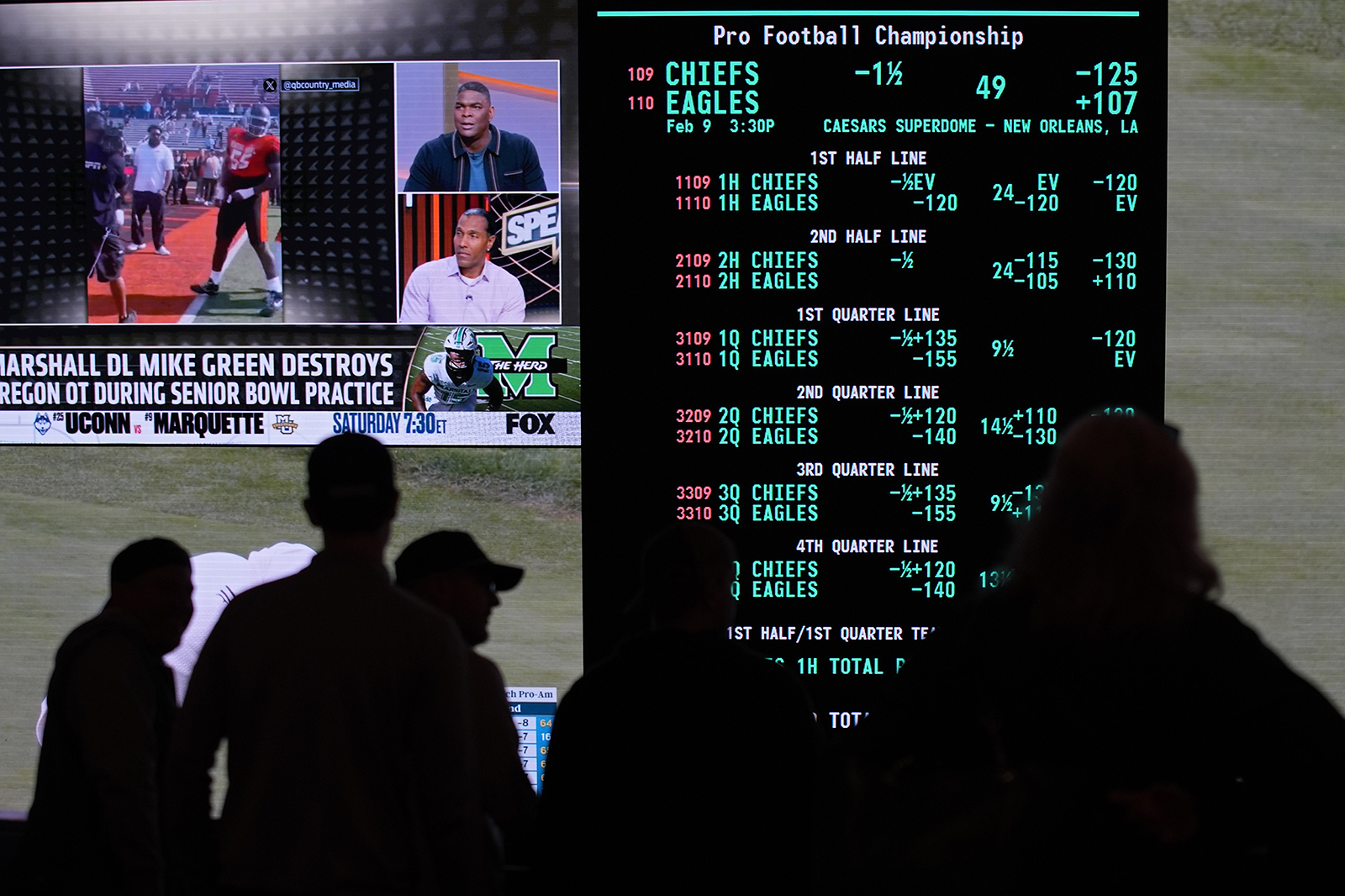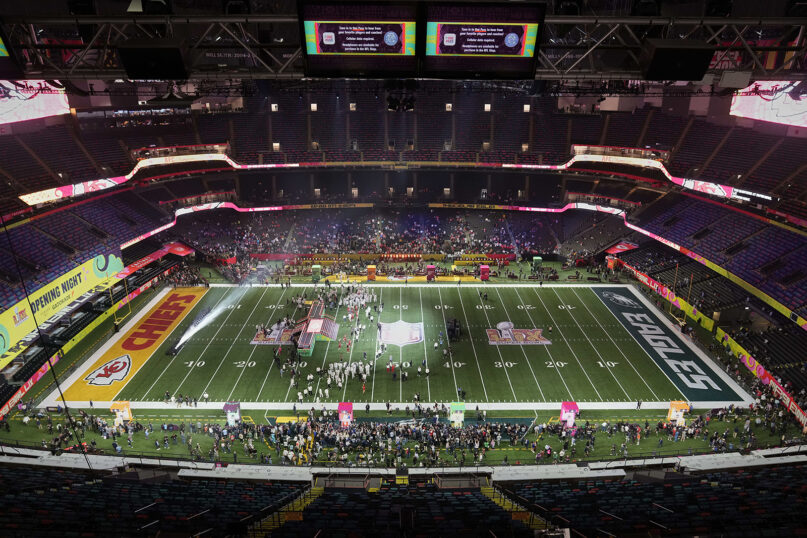
(RNS) — Les Bernel has a message for the millions of Americans who will bet on this year’s Super Bowl using betting apps and other legal sports books.
The house always wins.
Which means you will likely lose.
“We laugh it off and say, oh the house always wins,” said Bernel, national director of Stop Predatory Gambling, an anti-gambling nonprofit founded by a Methodist minister in the 1990s. But Americans lose billions gambling, he said, while sports-betting companies rack up profits.
Once considered a vice and the realm of Vegas casinos and organized crime, legal commercial sports betting has become America’s favorite pastime. Americans are expected to bet $1.39 billion with commercial gaming companies during Sunday’s Super Bowl — to be held Feb. 9 in New Orleans, pitting the Kansas City Chiefs against the Philadelphia Eagles — according to projections from the American Gaming Association.
Since the Supreme Court struck down a 1992 federal law that limited legal sports betting to Nevada in 2018, $450 billion has been wagered on sporting events in the United States, according to Legal Sports Report, a website that covers the sports-gaming industry. Sports-betting company revenues have reached nearly $40 billion. Much of that growth has been driven by online and mobile betting, which essentially turn cell phones into sports-betting windows, say critics like Bernal.

Les Bernal. (Courtesy photo)
Data from a 2024 AGA survey found that 88% of Americans see gambling as an acceptable form of entertainment, and many (76%) see gambling as good for the economy. Gaming industry officials see rising revenue as a sign that Americans love to bet — and that legal betting is a good thing.
“No single event unites sports fans like the Super Bowl, and that excitement extends to sports betting, with this year’s record legal handle reflecting its widespread appeal,” Bill Miller, AGA president and CEO, said in a recent press release, referring to the total amount bet on the big game.
The success of the gaming industry has critics like Bernel and faith leaders who oppose sports betting often fighting an uphill battle. They have little money to work with — Stop Predatory Lending, for example, has a budget of $138,000. And because the gaming industry is regulated by states, there’s not a national coalition of gambling critics. (Thirty-nine states currently allow legal sports betting, though some, like Wisconsin and Washington, restrict wagers to in-person betting sites.)
Bernel, who is Catholic, said commercialized gambling is the only business where the relationship with customers is “adversarial and predatory.”
“They want to take you down,” he said.
The advent of smart phone apps and online betting and the growth of parlay bets — where bettors wager on a series of outcomes in a game, like which player scores the first touchdown — has changed the nature of sports betting, he said, allowing customers to place repeated bets on the same game.
“They made sports gambling like playing a slot machine,” he said, and have made betting more addictive and socially harmful. He’s particularly concerned about the overall business model of gaming companies, where customers with gambling problems provide most of the profits.
For example, at PointsBet, a sportsbook owned by Fanatics, a major company, 70% of the revenue came from less than 1% of the customers in 2019 and 2020, according to The Wall Street Journal.
A 2024 report from the University of Massachusetts found that 90% of revenue at that state’s casinos came from only 10% of customers, which researchers found problematic.

The Kansas City Chiefs and Philadelphia Eagles participate during Super Bowl 59 Opening Night, Feb. 3, 2025, at the Caesars Superdome in New Orleans, ahead of the NFL championship game this Sunday. (AP Photo/David J. Phillip)
“There needs to be a reduction of the industry’s financial reliance on at-risk and problem gamblers, as the 90% of revenue from this 9.9% of the population is much too high,” researchers wrote in the report’s recommendation. (That report looked at casinos, not online sports betting.)
As a Catholic, Bernel said he was concerned that state governments are essentially benefiting from problem gamblers in the form of tax revenue. “We’re talking about loving our neighbors like God loves us,” he said. “This public policy is the complete opposite.”
In Minnesota, where mobile sports betting is illegal, the state’s Catholic bishops wrote to Governor Tim Walz recently, urging him to oppose making such betting legal. Jason Adkins, executive director of the Minnesota Catholic Conference, the public policy voice for Catholics in that state, said expanding gambling is not worth the cost.
Adkins said Catholics don’t see all games of chance, such as raffles or bingo, as unethical, but commercial sports betting is something different, with little social benefit and a great deal of harm due to gambling addictions.
“When you put a sports book in the cell phone of every person and give them 24/7 access to the most addictive forms of gambling and then make it easy to chase their losses with in-game betting, we think this is a serious problem,” he told Religion News Service in an interview.

Kathleen Benfield. (Photo courtesy Louisiana Family Forum)
Kathleen Benfield, legislative director for the Louisiana Family Forum, said her organization has long opposed legalized gambling — seeing it as a public health risk. She pointed to a recent study in The Lancet, which outlines the social harms of gambling.
“Gambling is not an ordinary kind of leisure; it can be a health-harming, addictive behaviour,” the summary of the Lancet study read. “The harms associated with gambling are wide-ranging, affecting not only an individual’s health and wellbeing, but also their wealth and relationships, families and communities, and deepening health and societal inequalities.”
Benfield believes nothing good will come from legalized gambling in the long run.
“It’s a house of cards,” she said. “And it’s going to fall.”
A new national survey of sports fans by Sport Spectrum, a faith-based magazine, found that few people saw sports betting in a negative light. Only 23% said they felt negative about sports betting, while 43 percent said they felt positive about sports betting. A third (35%) felt neutral. A third (32%) said they had bet on sports. Twenty-seven percent said they know of someone who’d been negatively impacted by sports betting.
Few sports fans felt enthusiastic about betting being part of sports broadcasts, with 28% seeing that as positive, and 40% seeing it as negative. A third (32%) were neutral.
Andy Konigsmark, a Presbyterian minister from Colorado, is among those who think that sports gambling can be an enjoyable experience, if done within limits. Konigsmark said that his parents, conservative Christians who taught Sunday school, would take him to a dog track while on vacation and give him a few dollars. He said betting made watching the race more exciting — and having only $5 meant the stakes were low.
Konigsmark said these days, he occasionally places a bet on a sports-betting app.
“I could spend $20 a month on this — and that’s it,” he said. “It’s the same as going to the movies.”

(Image from Pixabay/Creative Commons)
If he were betting every day, or for larger amounts of money, that would be a problem, said Konigsmark. And he’d like to see fewer gambling ads on television and more limits on what people can bet. He also said faith leaders could do more to help their people think through the issue. This past fall, he wrote an online article entitled, “A Christian Minister’s Guide to Gambling with Wisdom,” to do just that.
Benjamin Watson, an author and college football commentator who played 16 years in the NFL, said the rise of sports gambling has had little effect on players so far. Fans have time to think about gambling and fantasy sports, he said, while players are focused on trying to win. While pro sports teams and broadcasters have ties to gaming companies, he said, for the most part players are isolated from those concerns.
“It doesn’t impact what we do on the field,” Watson said.
Watson, who played in a pair of Super Bowls — winning with the Patriots in 2004, losing with the same team in 2007 — said he’d learned to be grateful in both outcomes. Winning and losing is part of life, he said, adding that “losing is terrible.”
“God is in control,” he said. “My goal is to glorify Him, whether I win or whether I lose, there’s still growth that happens across the board.”
Watson, who comments on college games for the SEC Network and other sports media, said he does not bet on sports — in part because he hates to lose. And he has no interest in promoting gambling.
“There’s a lot of data that’s come out, a lot of studies, showing that gambling is not beneficial on a cultural or a wholesale level,” he said. Those studies, he said, show increases in bankruptcies and addictions. So much so that ads for sports betting often come with a warning about those addictions.
“I’d just rather stay away from it,” said Watson, who is known for his outspoken advocacy of social issues like racial reconciliation and his opposition to abortion. “I don’t see the benefit.”
